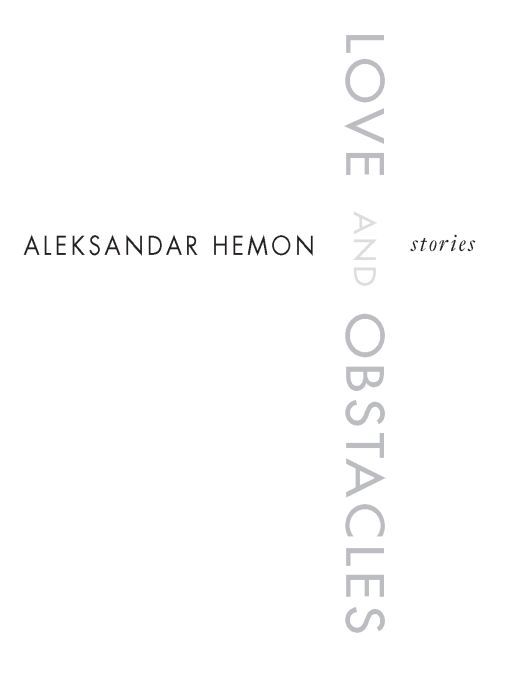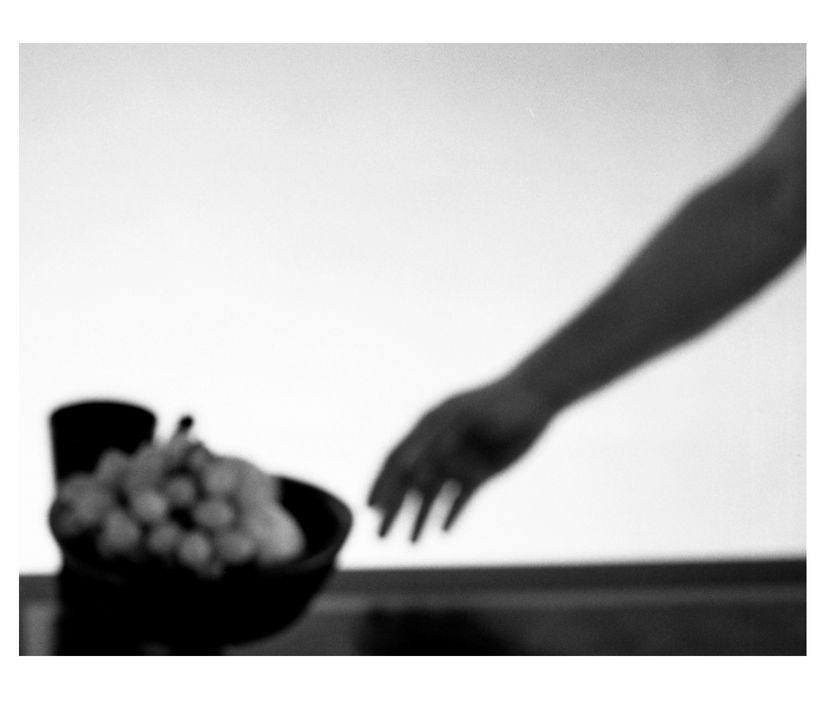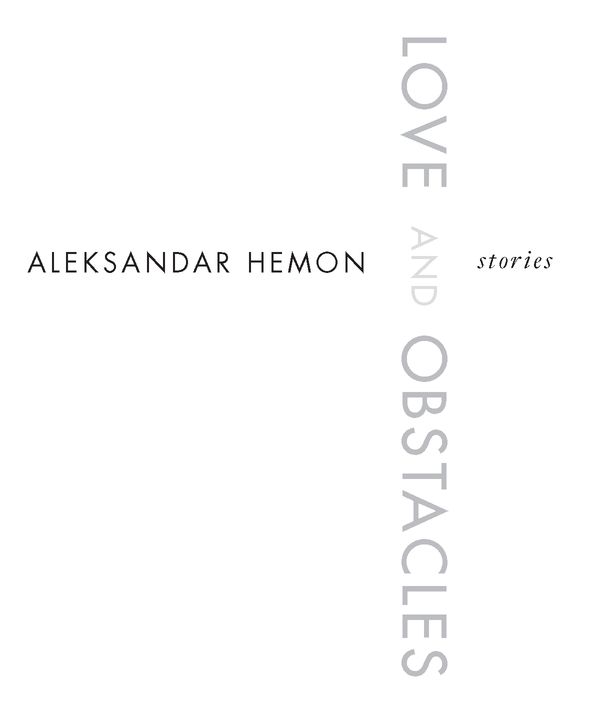Love and Obstacles
Read Love and Obstacles Online
Authors: Aleksandar Hemon


Table of Contents
ALSO BY ALEKSANDAR HEMON
The Lazarus Project
Nowhere Man
The Question of Bruno
Nowhere Man
The Question of Bruno

RIVERHEADBOOKS | A MEMBER OF PENGUIN GROUP (USA) INC. | NEW YORK | 2009


RIVERHEAD BOOKS
Published by the Penguin Group
Penguin Group (USA) Inc., 375 Hudson Street, New York, New York 10014,
USA • Penguin Group (Canada), 90 Eglinton Avenue East, Suite 700, Toronto,
Ontario M4P 2Y3, Canada (a division of Pearson Canada Inc.) • Penguin Books Ltd,
80 Strand, London WC2R 0RL, England • Penguin Ireland, 25 St Stephen’s Green,
Dublin 2, Ireland (a division of Penguin Books Ltd) • Penguin Group (Australia),
250 Camberwell Road, Camberwell, Victoria 3124, Australia (a division of Pearson
Australia Group Pty Ltd) • Penguin Books India Pvt Ltd, 11 Community Centre,
Panchsheel Park, New Delhi-110 017, India • Penguin Group (NZ), 67 Apollo Drive,
Rosedale, North Shore 0632, New Zealand (a division of Pearson New Zealand Ltd) >
Penguin Books (South Africa) (Pty) Ltd, 24 Sturdee Avenue, Rosebank, Johannesburg 2196, South Africa
Penguin Books Ltd, Registered Offices: 80 Strand, London WC2R 0RL, England
All rights reserved. No part of this book may be reproduced, scanned, or distributed in any printed or electronic form without permission. Please do not participate in or encourage piracy of copyrighted materials in violation of the author’s rights. Purchase only authorized editions. Published simultaneously in Canada
The following stories first appeared, in different form, in
The New Yorker
:
“Stairway to Heaven,” “Everything,” “The Conductor,” “Good Living,”
“Szmura’s Room,” “The Bees, Part 1,” and “The Noble Truths of Suffering.”
The New Yorker
:
“Stairway to Heaven,” “Everything,” “The Conductor,” “Good Living,”
“Szmura’s Room,” “The Bees, Part 1,” and “The Noble Truths of Suffering.”
The lines from Arthur Rimbaud’s “The Drunken Boat” and “Youth IV” are quoted
from Oliver Bernard’s translations, in
Collected Poems
(Penguin Classics, 1987).
from Oliver Bernard’s translations, in
Collected Poems
(Penguin Classics, 1987).
The lines from Zbigniew Herbert’s “Report from the Besieged City” are quoted from
John Carpenter and Bogdana Carpenter’s translation, in
Report from the Besieged City
and Other Poems
(Ecco Press, 1985).
John Carpenter and Bogdana Carpenter’s translation, in
Report from the Besieged City
and Other Poems
(Ecco Press, 1985).
Library of Congress Cataloging-in-Publication Data
Hemon, Aleksandar, date.
Love and obstacles : stories / by Aleksandar Hemon.
p. cm.
Love and obstacles : stories / by Aleksandar Hemon.
p. cm.
eISBN : 978-1-101-03284-8
I. Title.
PS3608.E48L68 2009
PS3608.E48L68 2009
2008050340
813’.6—dc22
813’.6—dc22
This is a work of fiction. Names, characters, places, and incidents either are the product of the author’s imagination or are used fictitiously, and any resemblance to actual persons, living or dead, businesses, companies, events, or locales is entirely coincidental.
While the author has made every effort to provide accurate telephone numbers and Internet addresses at the time of publication, neither the publisher nor the author assumes any responsibility for errors, or for changes that occur after publication. Further, the publisher does not have any control over and does not assume any responsibility for author or third-party websites or their content.
For my parents
Stairway to Heaven
I
t was a perfect African night, straight out of Conrad: the air was pasty and still with humidity; the night smelled of burnt flesh and fecundity; the darkness outside was spacious and uncarvable. I felt malarial, though it was probably just travel fatigue. I envisioned millions of millipedes gathering on the ceiling over my bed, not to mention a fleet of bats flapping ravenously in the trees under my window. The most troubling was the ceaseless roll of drums: the sonorous, ponderous thudding hovering around me. Whether it meant war, peace, or prayer, I could not tell.
t was a perfect African night, straight out of Conrad: the air was pasty and still with humidity; the night smelled of burnt flesh and fecundity; the darkness outside was spacious and uncarvable. I felt malarial, though it was probably just travel fatigue. I envisioned millions of millipedes gathering on the ceiling over my bed, not to mention a fleet of bats flapping ravenously in the trees under my window. The most troubling was the ceaseless roll of drums: the sonorous, ponderous thudding hovering around me. Whether it meant war, peace, or prayer, I could not tell.
I was sixteen, of the age when fear aroused inspiration, so I turned on the light, dug up a brand-new moleskin journal from my suitcase—the drums still summoning the vast forces of darkness—and wrote on the first page
only to hear my parents’ bedroom door violently open, Tata cursing and stomping away. I leapt out of bed—Sestra, startled, started whimpering—and ran after Tata, who had already flipped on the lights in the living room. I bumped into Mama cradling her worrisome bosom in her arms. All the lights were on now; a gang of moths fluttered hopelessly inside a light fixture; there were cries and screams; cymbals crashed all around us. It was terrifying.
Kinshasa 7.7.1983
“Spinelli,” Tata exclaimed against the noise. “What a dick.”
Tata slept in flannel pajamas far more appropriate for an Alpine ski resort than for Africa—air-conditioning allegedly hurt his kidneys. But before he left the apartment, he also put on a pith helmet, lest his bald dome be exposed to draft. When he furiously vanished into the drumming murk of the stairway, Sestra, now crying, pressed her face against Mama’s side; I stood in my underwear, my feet cold on the bare floor, a pen still in hand. The possibility of his not returning flickered in the darkness; it did not cross my mind to go after him; Mama did not try to stop him. The stairway light went on, and we heard a plangent chime. The drums were still rolling; another plaintive
ding-dong
fit snugly into the beat. Tata abandoned the bell and started pounding at the door, shouting in his stunted English:
ding-dong
fit snugly into the beat. Tata abandoned the bell and started pounding at the door, shouting in his stunted English:
“Spinelli, you are very crazy. Stop noise. We are sleep. It is four in the morning.”
Our apartment was on the sixth floor; there must have been scores of people living in the building, but it appeared to have been abandoned in a hurry. The moment the stairway light went off again, the drumming stopped, the show was over. The door opened, and a nasal American voice said: “I’m sorry, man. I absolutely apologize.”
By the time I went back to bed, it was dawning already. In the trees outside, a nation of birds replaced the blood-sucking bats and was now atwitter in a paroxysm of meaningless life. Sleeping and dreaming were beyond me now, nor could I write. Smoking on the balcony, I waited for everything to make sense until it couldn’t. Down on the street a scarcely clad man squatted by a cardboard box with cigarettes lined up on it. There was nobody else on the street. It seemed that he was guarding the cigarettes from some invisible peril.
In the early eighties, Tata was absent, working in Zaire as a minor Yugoslav diplomat in charge of communications (whatever that meant). Meanwhile, in Sarajevo, I responded to the infelicity of adolescence and the looming iniquity of adulthood by retreating into books; Sestra was twelve, oblivious of the ache sprouting inside me; Mama was midlife miserable and lonely, which I could not see at the time, my nose stuck in a book. I read compulsively, only occasionally reaching the surface of common reality to take in a fetid breath of other people’s existence. I would read all night, all day, instead of doing my homework; in school, I would read a book hidden under the desk, a felony frequently punished by a junta of class bullies. It was only in the imaginary space of literature that I felt comfortable and safe—no absent father, no depressed mother, no bullies making me lick the book pages until my tongue was black with ink.
I met Azra checking out books at the school library, and I immediately liked the readerly quietude on her bespectacled face. I walked her home, slowing down whenever I had something to say, stopping when she did. She had no interest in
The Catcher in the Rye
; I had not read
Quo Vadis,
feigned interest in
The Peasant Uprising
. It was clear, however, that we shared a passion for imagining lives we could live through others—a necessary ingredient of any love. Quickly we found a few books we both liked:
The Time Machine, Great Expectations, And Then There Were None
. That first day we talked mostly about
The Dwarf from a Forgotten Country
. We loved it, even though it was a children’s book, because we both could identify with a small creature lost in the big world.
The Catcher in the Rye
; I had not read
Quo Vadis,
feigned interest in
The Peasant Uprising
. It was clear, however, that we shared a passion for imagining lives we could live through others—a necessary ingredient of any love. Quickly we found a few books we both liked:
The Time Machine, Great Expectations, And Then There Were None
. That first day we talked mostly about
The Dwarf from a Forgotten Country
. We loved it, even though it was a children’s book, because we both could identify with a small creature lost in the big world.
We started dating, which meant that we often read to each other on a bench by the Miljacka, kissing only when we ran out of things to talk about, making out cautiously, as though letting it all go would have spent the quaint, manageable intimacy we had accrued. I was perfectly happy whispering a passage from
Franny and Zooey
or
The Long Goodbye
into her hair. So when Tata announced, upon his returning to Sarajevo on leave, that we would all spend the summer of ’83 in Africa together, I felt a strange relief: if Azra and I were apart, we could resist the torturous temptation and eschew the taint that the body inescapably inflicts upon the soul. I promised I would write to her every day, in my journal, as letters from Africa would arrive long after my return. I would record every thought, I promised, every feeling, every experience, and as soon as I came back, we would reimagine it all together, reading, as it were, the same book.
Franny and Zooey
or
The Long Goodbye
into her hair. So when Tata announced, upon his returning to Sarajevo on leave, that we would all spend the summer of ’83 in Africa together, I felt a strange relief: if Azra and I were apart, we could resist the torturous temptation and eschew the taint that the body inescapably inflicts upon the soul. I promised I would write to her every day, in my journal, as letters from Africa would arrive long after my return. I would record every thought, I promised, every feeling, every experience, and as soon as I came back, we would reimagine it all together, reading, as it were, the same book.
There were many things I wanted to note down that first night in Kinshasa: the west ablaze, the east impenetrably dark as we crossed the equator at sunset; the perfect recollection of the smell of her hair; a line from
The Dwarf from a Forgotten Country
that we had both liked so well:
I have to find my way home before the fall, before the leaves cover the path.
But I wrote nothing and assuaged my conscience by ascribing it to the drumming disturbance. What I didn’t write stayed in the back room of my mind, like the birthday presents I was not allowed to open until everyone had left the party.
The Dwarf from a Forgotten Country
that we had both liked so well:
I have to find my way home before the fall, before the leaves cover the path.
But I wrote nothing and assuaged my conscience by ascribing it to the drumming disturbance. What I didn’t write stayed in the back room of my mind, like the birthday presents I was not allowed to open until everyone had left the party.
Other books
Chronologie Des Rois De France by Pierre Vallaud
Monster War by Dean Lorey
Zombies Don't Cry by Brian Stableford
DR09 - Cadillac Jukebox by James Lee Burke
Finding Angelo (The Wine Lover's Daughter, Book 2) by Christa Polkinhorn
Undersea by Geoffrey Morrison
The Incredible Tito: Man of the Hour by Howard Fast
The Devil I Know by Claire Kilroy
Six Months to Get a Life by Ben Adams
We Install by Harry Turtledove